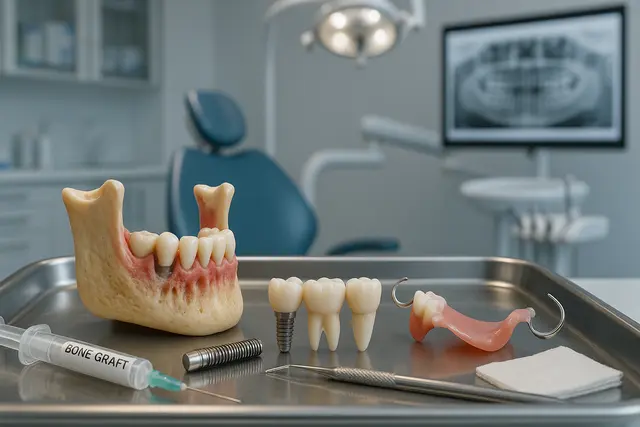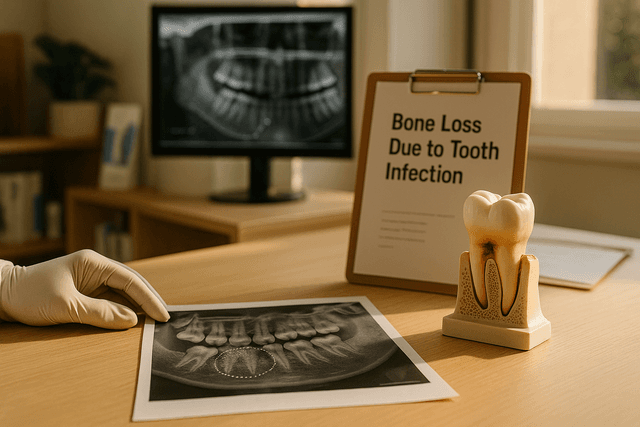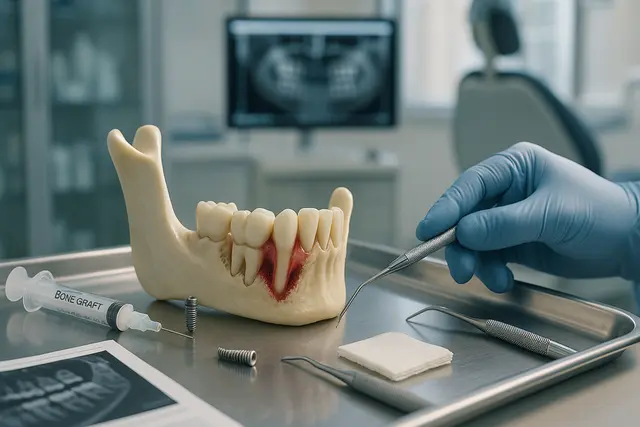Oral Health
5 min read
Jun 09, 2025
Your Complete Dental Hygiene Appointment Breakdown
Most people don’t exactly count down the days to their next dental hygiene appointment. But once you know what really happens during that visit, it gets a lot less intimidating, and maybe even a little satisfying. From the first friendly hello to that polished, squeaky-clean finish, here’s exactly what to expect (and why it matters) every time you sit in that chair.

You’ve circled it on your calendar. Maybe with a smile, maybe with a sigh. That’s right, it’s time for your dental hygiene appointment. But what really happens during that visit? Is it just a quick teeth cleaning, or is there more going on behind the scenes?
Spoiler alert: it’s more. A lot more. And understanding the process can help you feel more relaxed, prepared, and even a little proud when you walk out of your dentist’s office knowing your teeth and gums are well taken care of.
So let’s take you through a complete breakdown of your next dental hygiene appointment. Think of this as your friendly guide, with just enough pro tips to keep your smile bright between visits.
The Appointment: What to Expect from Start to Finish
When you make an appointment with your dental practice, you’re signing up for much more than a quick polish. A typical dental hygiene appointment lasts anywhere from 50 minutes to 90 minutes, depending on your oral health needs. If it’s your first visit or if you’re due for a deep cleaning, it may take a bit longer.
Here’s a quick snapshot of how the time and how long each part typically takes:
Check-in and paperwork: 5–10 minutes
Medical history update and x-ray if needed: 10–20 minutes
Exam and screening: 10–15 minutes
Scaling and teeth cleaning: 20–40 minutes
Polishing and fluoride treatment: 5–10 minutes
Patient education and wrap-up: 5–10 minutes
If your hygiene department runs like clockwork (many do), your 60-minute or 90-minute slot will fly by.
The Dental Hygiene Appointment: Not Just a Cleaning
First things first: your dental hygienist is your oral health ally. When you come in for a dental hygiene appointment, the hygienist is often the first professional you’ll see. Whether you’re visiting a private practice or a larger dental office, they’ll greet you, ask about your dental care routine, and make sure you’re comfortable.
Updating your medical history is more important than many patients realize. Your dental hygienist may ask about new medications, allergies, or medical conditions. Why? Because certain health issues can impact your oral health or even your response to treatment.
If it’s been a while or if your dentist recommends it, the hygienist may take x-rays to check for tooth decay, oral diseases or other concerns not visible to the naked eye.
The Dental Hygienist: The Heart of Your Appointment
Once you’re settled in, the dental hygienist gets to work. They start with a screening to check your oral health status. This may include measuring the depth of gum pockets to monitor for gum disease or periodontitis. Early detection of gingivitis or more advanced periodontal issues can save you a lot of trouble (and money) down the road.
Next comes scaling, where the hygienist uses a scaler to help remove plaque and tartar from your teeth. You might hear a scraping sound, it’s completely normal and nothing to stress over. This step is crucial because tartar buildup can lead to gum disease, tooth decay, and even tooth loss if ignored.
If you’re prone to sensitivity, let your hygienist know before they begin scaling. They can adjust their technique or use a special tool to make the experience more comfortable.
The Dentist: The Final Check-Up
After your dental hygienist finishes scaling and polishing your teeth, your dentist may step in for a quick exam. This is your dentist’s opportunity to evaluate your overall oral health, review your x-rays, and look for signs of tooth enamel wear, decay, or even oral cancer.
If your dentist spots any issues, such as a cavity or the need for a filling, they’ll discuss a treatment plan with you. This is also when cosmetic dentistry options might come up if you’re curious about enhancing your smile.
Oral Health: The Big Picture
Let’s be honest: brushing and flossing twice a day is a great habit, but it’s not a cure-all. A dental hygiene appointment helps catch what your toothbrush can’t, like plaque and tartar hiding in hard-to-reach spots.
Maintaining good oral hygiene is about more than avoiding cavities. Your oral health is connected to your overall well-being. Poor oral hygiene can contribute to bad breath, gum disease, and even systemic health problems like heart disease or diabetes.
Oral Hygiene Tips Between Appointments
If you’re wondering how to make your dentist smile (and keep your own smile healthy), here are a few tips:
Brush your teeth at least twice a day with a soft-bristled toothbrush.
Floss daily to help remove plaque between your teeth.
Use an antimicrobial mouthwash if recommended by your dentist.
Stick to your hygiene schedule, aim for a dental hygiene appointment at least twice a year.
If you smoke or use tobacco, quitting can greatly improve your oral health.
Keeping up with regular dental hygiene appointments ensures that minor issues don’t turn into major problems.
Preventive Care: Why It Matters
Think of preventive care as your insurance policy for your smile. Regular dental hygiene appointments can help prevent tooth decay, gum disease, and oral health issues before they become costly or painful.
If your dentist recommends scaling and root planing (often abbreviated as SRP), it means your gums need extra TLC. This deep cleaning procedure removes plaque and tartar below the gum line to treat periodontitis and restore healthier gum tissue.
Many patients are surprised to learn that a fluoride treatment during their appointment can strengthen tooth enamel and help prevent cavities, yet another win for preventive care.
Bad Breath: The Awkward Topic We All Think About
Let’s talk bad breath. If you’ve been worried about yours, you’re not alone. Persistent bad breath can be a sign of poor oral hygiene, gum disease, or even an undiagnosed medical condition.
Your dental hygienist can help pinpoint the cause and recommend steps to freshen your breath. Routine dental hygiene appointments and daily oral care are key players in keeping bad breath at bay.
Final Thoughts: Your Smile’s Best Friend
So now you know: a dental hygiene appointment is much more than a simple teeth cleaning. From thorough scaling to screenings for oral cancer and personalized patient education, your dental hygienist and dentist work together to protect your teeth and gums.
Next time you’re about to make an appointment, remember, you’re investing in more than a clean smile. You’re supporting your long-term oral health and giving your whole body a boost.
And if you haven’t scheduled your next dental hygiene appointment yet? Go ahead and make an appointment today. Your future self (and your dentist) will thank you.
What Happens During a Dental Hygiene Appointment?
A dental hygiene appointment includes more than just cleaning your teeth. It typically involves updating your medical history, taking x-rays if needed, screening for gum disease, removing plaque and tartar (scaling), polishing your teeth, and a final checkup by your dentist. It’s a complete oral health check from top to bottom.
Why Do Dental Hygienists Check Gum Pockets?
Measuring gum pockets helps detect early signs of gum disease. If the pockets are too deep, it could mean you have gingivitis or periodontitis. Catching these issues early can help prevent tooth loss and serious infections down the line.
Do I Really Need a Dental Hygiene Appointment Twice a Year?
Yes. Seeing your dental hygienist every six months allows for early detection of dental problems, removal of tartar buildup, and prevention of gum disease. Even with daily brushing and flossing, professional cleanings reach spots you can’t.
Can a Dental Hygiene Visit Help With Bad Breath?
Absolutely. Professional cleaning removes plaque and tartar that contribute to bad breath. Your hygienist can also identify underlying issues, like gum disease or dry mouth, that may be causing persistent odor and offer tailored solutions.
Read Next
Related Posts

Oral Health
Tooth Replacement Options to Prevent Bone Loss
Losing a tooth isn’t just about appearance, it can have a lasting impact on your oral health, jawbone strength, and overall quality of life. When teeth go missing, the jawbone begins to shrink, which can change your bite, your facial structure, and even your confidence. Fortunately, modern dentistry offers several effective solutions to replace missing teeth and prevent further bone loss.
4 min read
Sep 26, 2025

Oral Health
Bone Loss Due to Tooth Infection Explained: What It Means for Your Oral Health
A tooth infection isn’t just about pain, it can quietly damage the tissues around a tooth and even erode the jawbone that supports your smile. This guide explains how infections start, why they can lead to bone loss, the warning signs to watch for, and the treatments that can stop the spread and rebuild lost support.
5 min read
Sep 25, 2025

Oral Health
Understanding Bone Loss in Teeth: Causes and Treatments That Work
Bone loss in teeth is a silent threat that can compromise your smile, facial structure, and overall oral health. While it often goes unnoticed in the early stages, it can lead to serious consequences if left untreated. Understanding what causes dental bone loss, and how to prevent or manage it, is key to maintaining a strong, healthy foundation for your teeth.
5 min read
Sep 25, 2025
Don’t have time to research every dentist around you?
See why 30k+ patients trusted us